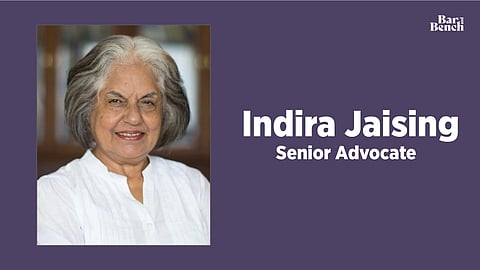
- Latest Legal News
- News
- Dealstreet
- Viewpoint
- Columns
- Interviews
- Law School
- Legal Jobs
- हिंदी
- ಕನ್ನಡ

Senior Advocate Indira Jaising has written to Chief Justice of India (CJI) DY Chandrachud raising concerns regarding lack of gender sensitivity amongst members of the Bar.
In a letter addressed to the CJI, Jaising drew the attention of the CJI to the treatment meted out to women lawyers in courtrooms by their male colleagues.
She praised the Supreme Court for recently releasing the 'Handbook on Combating Gender Stereotypes' but suggested that additional handbooks be released to address gender stereotyping in the Bar as well as in pleadings and arguments before courts.
"I am constrained to write to you with the request that the Court issue a handbook on gender stereotyping of lawyers who are women, which will provide guidelines to our male colleagues on how to deal with women at the bar and in law offices. While this Hon'ble Court provided guidelines on the 'entrenched paternalistic and misogynistic attitudes', these are often played out in day to day work in court," Jaising's letter said.
To drive the point home, Jaising cited her own varied experiences as a member of the Bar.
She says that the stereotyping is on a spectrum. On one end is the singling out and projecting of competent women lawyers as "empowered women" and calling women lawyers "delightful" in court.
On the other end is the stereotyping of women lawyers as "aggressive", even though they are arguing just as their male colleagues do.
"I have been referred to by my male colleagues as ‘delightful’ during court hearings, something which I promptly objected to and which is recorded in a judgment of the court as a form of harassment in court. Significantly, at the other end of the spectrum, I get told by my male colleagues ‘Don't raise your voice in court’," she recounted.
Regarding stereotyping in pleadings, she said that particularly shocking forms of gender stereotyping can be found in petitions filed on behalf of the husbands in matrimonial cases.
She also flagged the "humiliating remarks" made during arguments in rape trials.
"Gender stereotypes start with pleadings, continues with oral arguments and finally finds its way in judgments. I request that these issues are also addressed in an appropriate manner by the Supreme Court of India through a Model Handbook on Practice Guidelines for pleadings which can be adopted by High Courts and District Courts," Jaising's letter stated.
Another pertinent issue highlighted was with respect to a recent judgment of the Calcutta High Court delivered after the handbook was released. The judgment said that women have unleashed "legal terrorism" by misusing Section 498A of the IPC which criminalises matrimonial cruelty.
"This is a typical example of stereotyping, that is generalizing an issue while the attempt should be to focus on the case at hand. It is not my contention that in a given case, if the law is misused, power of the High Court must not be invoked. But to say that women have unleashed 'legal terrorism' by misusing Section 498A is the surest form of stereotyping, leading to the impression of gender bias in the judge," Jaising said while clarifying that she was not commenting on the merits of the Calcutta case.
Hence, apart from the suggestions to publish handbooks, Jaising also suggested that the top court publish a list of words which may be avoided in advocacy, pleadings and judgements of courts.